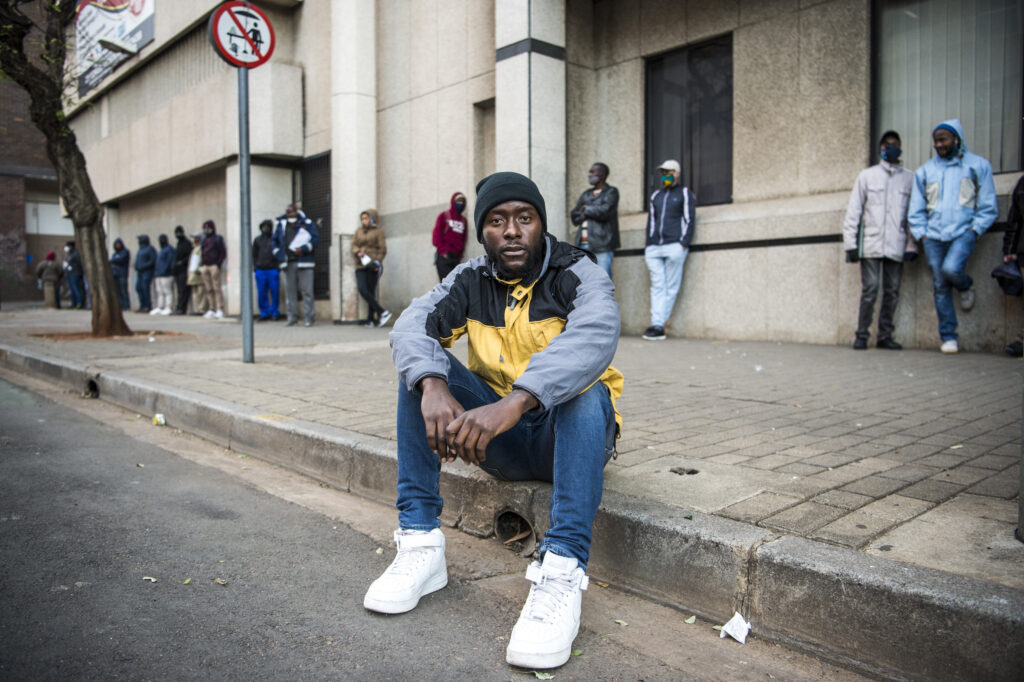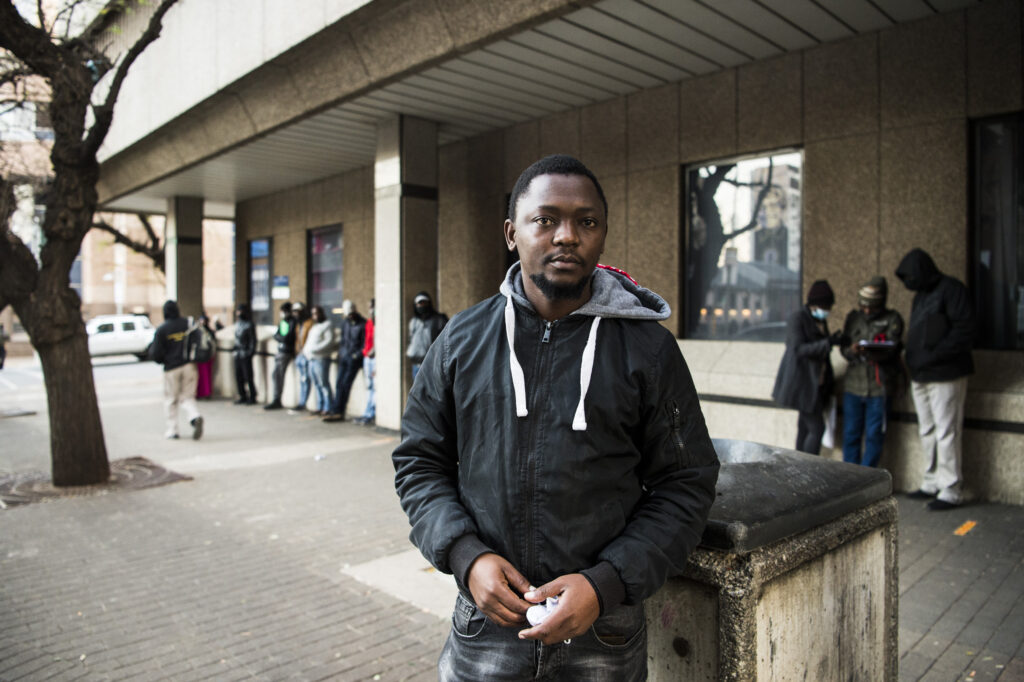Despair: People queue to the end of the block at the Jo’burg labour department for UIF payments. (Delwyn Verasamy/M&G)
Times are tough because of Covid-caused retrenchments and salary cuts — made worse for many because their Unemployment Insurance Fund (UIF) payouts continue to be delayed.
Lucas Mashaba is one of many South Africans who has been affected since the Covid-19 pandemic hit the country, resulting in a national lockdown that has affected many businesses. The 29-year-old Mashaba, who earns R6 600 a month, has not worked since the end of March, when lockdown was imposed, and has not received a salary from his employer since then.
He is faced with a daunting task of having to pay R1 500 rent for one room in Alexandra, Johannesburg, which he shares with his wife and two children. He has had to resort to selling some of his prized possessions since he has not been earning and his UIF has not been paid.
He also has been faced with the bureaucratic process of trying to get his UIF payment processed.
 Lucas Mashaba has not received their salaries or UIF payments since March. (Delwyn Verasamy/M&G)
Lucas Mashaba has not received their salaries or UIF payments since March. (Delwyn Verasamy/M&G)
“I ended up selling my car because of hunger and to be able to provide for my kids and their mother. What’s worse is that other people have managed to get their UIF money. The employer told us they cannot pay us salaries because they also have been affected by Covid-19. We asked for forms to apply for UIF; this became a long struggle,” said Mashaba. “I have been sent around, and today the labour office tells me they will only work on Thursday. No explanation given.”
Mashaba does woodwork for Wit-Color, a digital printing company with offices in Cape Town and Johannesburg. He has worked for the company for almost two years.
“I have been surviving off my partner since she works some piece jobs. I struggle to even buy such things as nappies and baby formula for my eight-month-old child. It is embarrassing and the company doesn’t want to assist us at all. They only tell me, ‘you’re not the only one’ who is still awaiting his UIF. It’s very difficult to survive for this long without a salary,” said Mashaba
Another employee who is facing the same problems is his colleague Tebogo Khulou, who lives in River Park, Johannesburg, with his fiancee and seven-year-old son. Khulou, who works as a driver at Wit-Color. He also uses his salary of R5 200 to support his mother and three younger sisters, two who are still at school and one who is unemployed.
“Since I have not been getting any salary. My fiancee has been taking care of us. Paying rent, school fees and assisting with my own needs,” said Khulou. It has been the worst time for us, and this is straining our relationship because I have put all the burden on her. I can’t even help my mother like I used to do before. She has to make ends meet on her own.
“The company we work for has delayed submitting my UIF forms to claim. It seems like they do not want to help us access the money, yet we’re suffering.”
The company served Khulou, Mashaba and other employees with a letter saying they won’t get a salary because the company has been affected by the lockdown. In the letter it stated: “We have applied with the UIF fund for assistance and once we get information back from the fund you will be informed.”
Wit-Color’s accounts manager, Elizabeth Xaba, said the company had submitted the workers’ UIF applications in April and that only some employees were paid.
“We also don’t know what is holding up [payment], but we are doing everything in our power to ensure that everyone is being assisted. Every time we call them [UIF], we get different answers from different people. We have done everything as a company to assist. And I have told everyone that I am available to assist them with any documentation they need,” said Xaba.
Workers who have been put on leave, laid off temporarily or whose employers can’t afford to pay full salaries are entitled to the Covid-19 Temporary Employer/Employee Relief Scheme payouts.
The delays in the payments of UIF have also angered unions, who blame employers for dragging their feet in assisting employees.
Riefdah Ajam, the secretary of the Federation of Unions of South Africa (Fedusa), said employers were taking too long to submit claims on behalf of their workers.
“We understand that the UIF system is under immense pressure currently because of the Covid-19, but we have noticed that employers drag their feet to file with the fund on behalf of their employees. This is their obligation and they should assist and walk with people through the process,” said Ajam. “They must allow quick access to the fund also, so that people access their money speedily, people are desperate enough as it is and that cannot be a good thing.”
 Tebogo Khanou has not received their salaries or UIF payments since March. (Delwyn Verasamy/M&G)
Tebogo Khanou has not received their salaries or UIF payments since March. (Delwyn Verasamy/M&G)
He said Fedusa was in discussions with the UIF commissioner, Teboho Maruping.
Ajam added: “We also condemn the hypocrisy that we have heard about, of employers claiming the money and keeping it for themselves and not paying it to the workers who desperately need it at this time. We will fight this.”
She said the UIF is in need of staff members who will help with the quick processing of the avalanche of applications in the system, particularly call centre agents.
Sizwe Pamla, the spokesperson for labour federation Cosatu, said the slow pace at which UIF payments are being processed was “disappointing and not excusable anymore”.
“We do understand that the UIF system was not designed to handle the pressure brought by this pandemic. And the excuse being made about shortage of infrastructure. But now we’re also seeing that there’s just absolute incompetence that has taken over. These people had two full months to figure this out and they have failed,” said Pamla.
“We are engaging with the minister of labour and the UIF officials to speedily fix their errors and make sure people get their money.
She said there was “an ongoing trend of corruption” by employers who take the money intended for the workers who need it. “This is wrong and we are pushing the auditor general to intervene and audit all payments that have been made since the lockdown started.”
The UIF has recently announced an investigation into allegations that companies have been stealing Covid-19 payouts. Minister of Employment and Labour Thulas Nxesi said earlier this month that the department has been made aware of companies allegedly lending employees the UIF payouts and others giving workers only some of the money.
In April, Maruping said that the UIF had tweaked and improved its systems to make sure the claiming process runs smoothly.
The UIF’s spokesperson, Makhosonke Buthelezi, said the organisation had spotted fraudulent activities in their system and had halted payments.
“During the week of the 9th June 2020 we had to stop the May payments for three days because we had detected suspicious fraudulent activities. During this period we identified gaps and tightened them up and unfortunately we were out of the payment scheduled for three days,” he said.